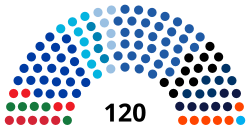
Back Knesset Afrikaans Knesset ALS Kineset ANN كنيست Arabic الكنيست ARZ Knesset AST Knesset Azerbaijani Кнессет Bashkir Кнэсет Byelorussian Кнэсэт BE-X-OLD
The Knesset הכנסת الكنيست | |
|---|---|
| 25th Knesset | |
 | |
| Type | |
| Type | |
| Leadership | |
| Structure | |
| Seats | 120 |
 | |
Political groups | Government (61)
Supported by (7)[5]
Opposition (52)
|
| Elections | |
| Closed list proportional representation D'Hondt method with a 3.25% electoral threshold | |
Last election | 1 November 2022 |
Next election | On or before 27 October 2026 |
| Meeting place | |
 | |
| Knesset, Givat Ram, Jerusalem | |
| Website | |
| Official website | |
| Part of a series on |
| Jerusalem |
|---|
 |

The Knesset (Hebrew: הַכְּנֶסֶת, romanized: HaKnesset [haˈkneset] ⓘ lit. 'gathering, assembly', Arabic: الْكِنِيسِت, romanized: al-Kinisit) is the unicameral legislature of Israel.
The Knesset passes all laws, elects the president[6] and prime minister[7] (although the former is ceremonially appointed by the Prime Minister), approves the cabinet, and supervises the work of the government, among other things. In addition, the Knesset elects the state comptroller. It also has the power to waive the immunity of its members, remove the president and the state comptroller from office, dissolve the government in a constructive vote of no confidence, and to dissolve itself and call new elections. The prime minister may also dissolve the Knesset. However, until an election is completed, the Knesset maintains authority in its current composition.[8] The Knesset meets in Givat Ram, Jerusalem.
Members of the Knesset are elected nationwide through proportional representation.
- ^ "Leader of the Opposition". Knesset=access-date=15 January 2023.
- ^ "Ben-Gvir, Otzma Yehudit MKs resign from coalition, gov't". The Jerusalem Post. 19 January 2025.
- ^ "Otzma Yehudit defends opposition to hostage deal, vows to support government from outside coalition". The Times of Israel. 16 January 2025.
- ^ "Personnel changes in the 25th Knesset". Knesset. Retrieved 21 January 2025.
- ^ [2][3][4]
- ^ "Basic Law – The President of the State (1964), article 3". Jewish Virtual Library. Retrieved 13 October 2023.
- ^ "Basic Law – The Government (2001)". Jewish Virtual Library. Retrieved 13 October 2023.
- ^ The Knesset. Jewish Virtual Library. Retrieved 8 September 2011.